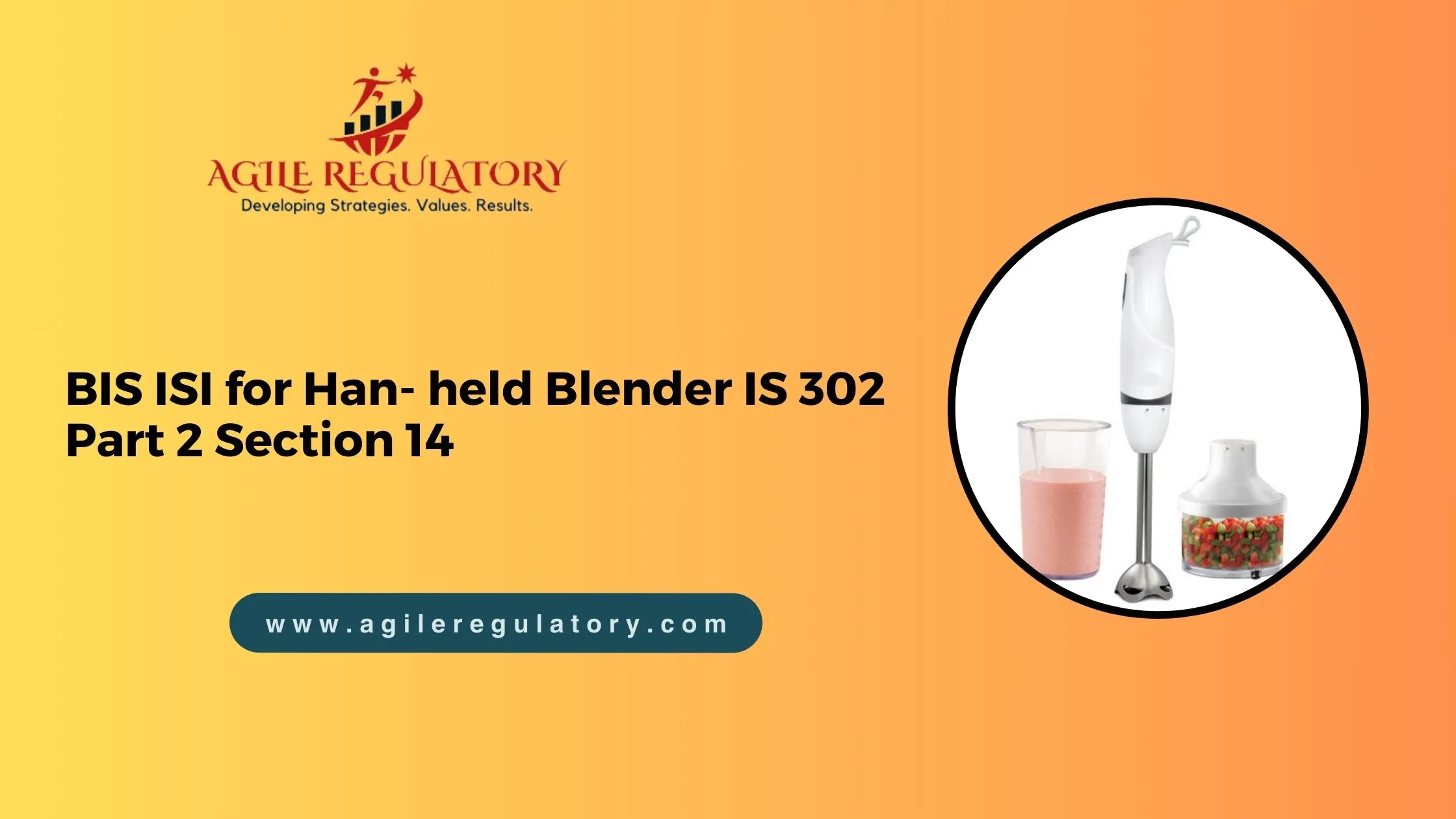
BIS ISI for Hand held Blender IS 302 Part 2 Section 14

Overview of BIS for Hand-held Blender
BIS Certification for hand blenders is a vital quality and safety certification process in India, ensuring that hand blenders meet specific Indian standards, guaranteeing consumer safety and product quality. Manufacturers and importers must undergo rigorous testing and compliance verification, encompassing electrical safety, performance, and durability, and adhere to evolving BIS regulations. BIS certification process involves application submission, preliminary factory inspections, and sample testing, culminating in the issuance of certification and the right to use the ISI Mark. This certification not only fosters consumer trust but also underscores the commitment to producing safe, high-quality hand blenders in compliance with established standards, promoting consumer safety and product quality.
Benefits of BIS for Hand-held Blender
Obtaining a BIS (Bureau of Indian Standards) certification for hand blenders offers several significant benefits for manufacturers, importers, and consumers:
Legal Compliance: BIS Certification is mandatory for hand-blender manufacturers and importers in India, ensuring legal compliance with safety and quality standards. It helps businesses avoid legal complications and penalties.
Enhanced Safety: BIS-certified hand blenders are subjected to rigorous safety testing, reducing the risk of electrical and mechanical hazards. This ensures consumer safety during usage.
Improved Product Quality: The certification process involves performance and quality assessments, encouraging manufacturers to produce hand blenders that meet or exceed established standards. This results in higher-quality products.
Consumer Confidence: The BIS mark on a hand blender instils confidence in consumers, assuring them that the product is safe and of high quality. This can lead to increased sales and brand reputation.
Market Access: Many Indian retailers and distributors prefer to stock BIS-certified products, allowing manufacturers to access a broader market and gain a competitive edge.
Export Potential: BIS certification is recognized internationally, which can facilitate export to countries that recognize Indian standards, expanding market opportunities.
Reduced Product Liability: With a BIS-certified hand blender, manufacturers may have reduced liability in the event of product-related accidents, as they can demonstrate adherence to safety standards.
Long-Term Sustainability: The ongoing surveillance and compliance requirements of BIS certification encourage manufacturers to maintain quality and safety standards over the long term.
Consumer Education: The BIS mark educates consumers about the importance of purchasing safe and reliable products, contributing to a safer marketplace.
Competitive Advantage: BIS certification sets a manufacturer apart from non-certified competitors, as it signals a commitment to safety and quality that can attract more discerning customers.
Registration Process of BIS for Hand-held Blender
BIS registration is mandatory for many electronic and electrical products to ensure safety and quality. Here are the steps to apply for BIS registration for a hand blender:
Step 1: Selection of Applicable Standard: An Applicant needs to select the appropriate standard as per the BIS-published Indian Standards.
Step 2: Sample Testing: Manufacturers or importers of Hand Blenders must have to submit their samples to the BIS-approved lab for testing as per Specific standards.
Step 3: Prepare Documentation: We need to prepare the necessary documentation for the BIS application. Which typically includes:
Documents Required for BIS for Hand-held Blender
 Test reports from the BIS-recognized laboratory
Test reports from the BIS-recognized laboratory
 Details of your manufacturing facility
Details of your manufacturing facility
 A list of products you intend to register
A list of products you intend to register
 Details of your quality control process
Details of your quality control process
 An affidavit stating that you will comply with the BIS rules and regulations
An affidavit stating that you will comply with the BIS rules and regulations
 A request letter for BIS certification
A request letter for BIS certification
 A copy of the trademark registration certificate (if applicable)
A copy of the trademark registration certificate (if applicable)
 ID Proof and Address Proof of the Applicant
ID Proof and Address Proof of the Applicant
 PAN Card of the Company
PAN Card of the Company
 Certificate of Incorporation/Partnership Deed
Certificate of Incorporation/Partnership Deed
 GST Certificate/MSME Certificate
GST Certificate/MSME Certificate
 Electricity/Landline/Water Bill
Electricity/Landline/Water Bill
 Layout Plan of the Manufacturing Site
Layout Plan of the Manufacturing Site
 Proof of Ownership/Property
Proof of Ownership/Property
 List of Raw materials
List of Raw materials
 List of machineries/test equipment
List of machineries/test equipment
 Any other documents required by the BIS
Any other documents required by the BIS
Step 4: Online Submission: Applicant needs to submit the prepared documents along with BIS approved lab test report to the BIS online portal.
Step 5: Payment of Fees: Pay the required application fee as applicable. A fee will vary depending on the applicable standard and type of enterprise.
Step 6: Preliminary Factory Inspection: BIS will conduct a preliminary factory inspection to verify that the manufacturing process and quality control measures comply with the BIS requirements.
Step 7: Sample Submission: You may be required to submit samples of your hand blenders for further testing and verification.
Step 8: Evaluation and Testing: The BIS will evaluate your application, documents, and test results. If your product meets the standards, you will be granted BIS certification.
Step 9: Certification Issuance: Upon successful evaluation and compliance, BIS will issue a certificate for your hand blender, allowing you to use the ISI mark on your product.
Step 10: Compliance and Surveillance: After certification, you'll need to adhere to the BIS regulations and standards to maintain your certification. BIS may conduct regular surveillance and testing of your products to ensure ongoing compliance.
Step 11: Marking: You can now mark your product with the ISI certification mark, indicating that it meets BIS standards.
Role of Agile Regulatory
Agile Regulatory assists manufacturers and importers of hand blenders in obtaining BIS (Bureau of Indian Standards) certification.
Regulatory Expertise: Agile Regulatory is specialized in BIS certification and is experienced in the quality standards and procedures established by the BIS. We have a deep understanding of the documentation and process necessary for successful certification.
Initial Assessment: Agile Regulatory typically begins the project by conducting an initial assessment of the manufacturer's or importer's hand blenders and their existing quality control processes. We identify gaps and areas that need improvement to meet BIS standards.
Documentation Preparation: One of the most critical aspects of BIS certification is preparing the required documentation. We assist in compiling and organizing the necessary paperwork, including test reports, quality control procedures, and other relevant documents.
Application Submission: We guide clients through the application submission process, ensuring that all necessary information and documents are correctly provided to the BIS.
Testing Coordination: Agile Regulatory often have established relationships with BIS-recognized testing laboratories. They can help coordinate product testing, ensuring that the hand blenders undergo the required assessments for compliance.
Preliminary Factory Inspection: If a Preliminary Factory Inspection is required, Agile Regulatory will facilitate the inspection and prepare the manufacturing facility for the BIS evaluation.
Sample Submission: We assist in preparing and submitting product samples for further testing, ensuring that they meet BIS requirements.
Application Follow-Up: Agile Regulatory monitors the progress of the BIS application and liaise with the BIS authorities as needed to address any inquiries or issues that may arise during the evaluation process.
Compliance Strategy: We help clients establish and implement effective quality control measures to maintain ongoing compliance with BIS standards, often providing guidance on maintaining product quality and safety.
Training and Awareness: We may also offer training programs to educate manufacturers and their teams on BIS compliance and best practices.
Continuous Support: Even after certification is obtained, we continue to offer support in terms of surveillance and compliance checks, helping to ensure that the manufacturer's products consistently meet BIS standards.
Market Entry Strategy: In addition to the certification process, Agile Regulatory assist in developing a market entry strategy, which can be crucial for expanding the reach of certified products.
#checkout a detailed process: bis isi mark certification
Leave a Reply
Your email address will not be published. Required fields are marked *










